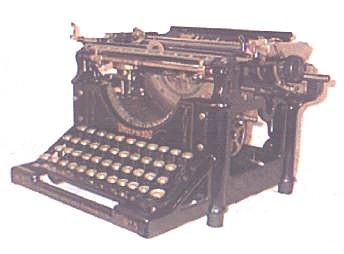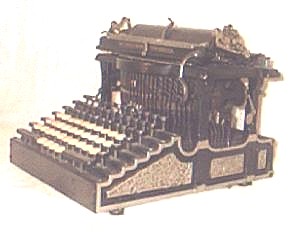
As Milwaukee was the birthplace of the first practical commercially produced “writing machine”, Mr. Dietz felt that the repository of an outstanding collection along with associated material should be located in that city. Ultimately, he developed, by means of correspondence and travel, what is considered the world’s most complete collection of its kind. This he donated to the Milwaukee Public Museum, along with archive materials including illustrations, advertisements, documents, and other historical data.
Carl P. Dietz was a Milwaukee City Alderman and Chairman of the Museum’s Board of Trustees. Carl started collecting typewriters for the museum in the mid 1930's. By the mid 1950s, Carl has assembled the core of this remarkable collection.
The Carl P. Dietz Typewriter Collection is one of the largest, most comprehensive collection of its kind in the world and is still housed in the Milwaukee Public Museum.
At last count, the collection contained 800 typewriters, ranging from the first commercially produced typewriter to modern, single element machines. The collection is particularly strong in early American typewriters.
Included in the collection are 3,500 pieces of trade literature which include instruction manuals, advertisements, repair manuals, price lists, and postcards. These materials provide data to identify and date machines, note model changes and improvements in typewriter design and follow the economic changes in the industry. This literature respsents an important and irreplaceable historical resource.
The collection also includes over 1,500 manuscripts which were primarily the gift of Miss Priscilla Densmore, a direct descendant of James and Amos Densmore who financed the development and early production of Christopher Latham Sholes’ machines. Miss Densmore’s donation contains the correspondence between Sholes and the Densmores, early patents, typewriter drawings, and legal documents associated with the investion, development, and production of the typewriter.
The Dietz Collection also includes over 500 typewriter related specimens, such as ribbon tins, paper weights, speed contest ribbons, postcards and stereo optical cards.

Typewriter Collecting
Do you want to know what kind of typewriters make up the perfect
collection? Of course you do. Well, take a good look at your collection.
That's it, the perfect collection.
Chances are good you have an Underwood No.5, Royal 10, Remington 10, or
Folding Corona in there somewhere. Or maybe you have an Oliver, L.C.
Smith, a Hammond or Blickensderfer.
These same machines are represented in every collection in this great
country of ours.
As a collective, we spend less time talking and writing about these
machines than we do about machines we will never hold.
Most of us dream of the Sholes and Glidden, Blick Electric, and Edison
knowing well that this dream is not meant to be, all the while we look and
even gaze at our so called "common" machines.
Yet, they give us joy. No, it's not a Sholes but the thrill of the hunt,
that "Never ending search" driving you to the discovery of that new
machine, that common machine, that Oliver 9 is no less.

Typewriter History
From the book, Office Management Its Principles and Practice Copyright
1918 by the Ronald Press Company the following was extracted.
New Devices as an Aid to Efficiency
An office may fall far behind a competitor by not watching for new uses to
which a well-established appliance may be put, as well as by delaying too
long the introduction of entirely new devices. The portable typewriter has
added much to the effectiveness and value of the reports of salesmen and
other field men. "We find,"says Charles B. Moore, Vice-President of the
Oxweld Railroad Service Company, "that reports written by our 18 men using
portable typewriters are superior to hand-written reports, since they not
only save the time of the traveling experts who write them but the time of
the home office where they are studied, filed, and referred to. Carbon
copies provided by the typewriter are kept by the men for personal use and
are available if the other reports are lost."
MEN OF ACHIEVEMENT
INVENTORS
BY
PHILIP G. HUBERT,
JR.
1895
C. L. SHOLES AND THE TYPEWRITER
A great many men contributed to make the typewriter what it is to-day — as much of
an improvement upon the pen as the sewing-machine is upon the needle. So long ago as
1843 some patents were taken out for divers forms of writing machines, all more or less
impracticable. It was not until C. L. Sholes, then of Wisconsin took up the problem, in
1866, that the present form of a number of type-bars, arranged so that their ends strike
upon a common centre, was devised. Sholes died in 1890, having also helped by many
minor devices the increase in the use of writing-machines. From 1865 to 1873 he made
thirty different working models of writing machines, devoting himself to the task almost
day and night for eight years.
Volume 1................SPRING
1982................Number 2
by: Dan Post
THE DOLLAR VALUE OF OLD TYPEWRITERS
The dollar value of old typewriters, like labor and postage, has risen
with the times. But the price should not be the focal point. The fact is
that the collector generally values early machines for their unique
historical significance..."One party pestered me by mail and phone for a
year for me to trade him my Ford," writes Dick Skeen (CA). "Why can't
people understand that I want to keep my machine as much as they want
them?" he ponders. Value is promoted by dealers and auction houses, seldom
by collectors.
APPRAISAL CONTINUES TO BE AN ENIGMA for the collector. Much
depends upon how badly the prospective buyer wants the particular
typewriter. Ultimately, it becomes a compromise between buyer and seller
-- the machine being worth only what the buyer agrees to pay. Common,
readily available models are of primary attraction only to the beginning
collector. Those the initiated enthusiast still seeks are rated
substantially higher.
BEN FRANKLIN MADE SOME ASTUTE OBSERVATIONSin his day.
Some
still apply. Like: "It is important to apply caution in collecting -
otherwise, one day, your collection will collect you."
Thanks for stopping by.



